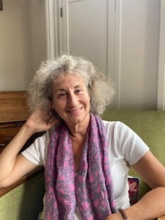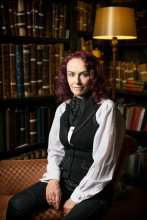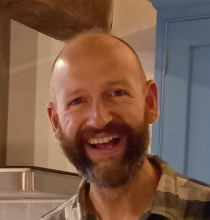We're delighted to report that Imtiaz Dharker has chosen the 3 winning poems. She has written remarks form each one indicating why she chose it.
The winners of the Plough Prize 2023 are:
1st Prize: Mara Bergman
 Imtiaz's remarks: "The poet builds up a moving picture of the mother’s life through the people who came in contact with her and helped her in some way. Much of the beauty of this poem comes from the details, not of her life but theirs. Its structure heightens the feeling of an unending series of links, with the second half of the second line of the couplet often leading the reader on: ‘What of…? ‘And there was…’ ‘There must have been someone…’. The effect is almost hypnotic. The poet does not shy away from the random and transitory nature of the community’s help and care. ‘Artie and Annette next door/who took her out on Mother’s Day with their mothers, then moved/ to Virginia to be near their daughter’. The end of the poem suggests a continuation, others moving in, ‘living her life’, with succeeding networks of connection and support we can only guess at."
Imtiaz's remarks: "The poet builds up a moving picture of the mother’s life through the people who came in contact with her and helped her in some way. Much of the beauty of this poem comes from the details, not of her life but theirs. Its structure heightens the feeling of an unending series of links, with the second half of the second line of the couplet often leading the reader on: ‘What of…? ‘And there was…’ ‘There must have been someone…’. The effect is almost hypnotic. The poet does not shy away from the random and transitory nature of the community’s help and care. ‘Artie and Annette next door/who took her out on Mother’s Day with their mothers, then moved/ to Virginia to be near their daughter’. The end of the poem suggests a continuation, others moving in, ‘living her life’, with succeeding networks of connection and support we can only guess at."
Mara says: I wrote What Became of Judy at Chase a few years after my mother’s death. Previous poems were quite emotional and, finally, having gained some distance, I was able to think about my mother's life more objectively. I wondered about some of the people who’d played a part in it, those who helped make it possible for her to retain her independence and remain in her house, however seemingly incidental their role, as well as friends. My starting point was kind and patient Judy Heefner at Chase bank, and soon all the others started tumbling onto the page.
What Became of Judy at Chase
who always took the time to help my mother
balance her cheque book when it needed to be balanced, and
Dr Rothman at OCLI Vision on Hempstead Turnpike, who saw her
every few months and saved her eyesight? What of
Mindy at Jupitor’s, who coloured and cut my mother’s hair
in the strip mall next to the library and where on Saturdays they served
bagels with cream cheese and coffee from a large silver urn? I think about
the three men who spoke Spanish as they cut my mother’s lawn, replanted
the arborvitaes when they turned brown, and
the man who did repairs around the house – a leaky tap, a window
that jammed – and the other one who once a year checked the alarm
to ensure it was working, cleaned out the thin webs of spiders that
could set it off in an instant, have the police at the door. And there was
Michael, who, rain or shine, pumped her gas and washed
her windscreen, kept her car safe beyond the years she shouldn’t
have been driving. There must have been someone
at CVS who noticed how frail she was growing, who helped her
with her points card, bagged her shopping, escorted her to the car, and
someone at Iavaronne, her favourite place of all, where they sang in Italian
behind the counters while she bought gourmet meals-for-one. Of course
there were the mah-jongg ladies she could talk to about anything
the way she could her friends at the beach club who played canasta on the sand
outside their cabanas. But no one compares to Artie and Annette next door
who took her out on Mother’s Day with their mothers, then moved
to Virginia to be near their daughter. I wonder about the couple who bought
my mother’s house, how they never met her, how they’re living her life.
2nd Prize: Rosie Garland
 Imtiaz's remarks: "I enjoyed the stretch and reach of this poem, the playful dance between the terms of quantum physics and the music, bouncing off each other like refractions in a glitterball, all cheap paste, mirrors and strobed movement. The language drags us on to the floor, and leaves us ricocheting between Now? and Now."
Imtiaz's remarks: "I enjoyed the stretch and reach of this poem, the playful dance between the terms of quantum physics and the music, bouncing off each other like refractions in a glitterball, all cheap paste, mirrors and strobed movement. The language drags us on to the floor, and leaves us ricocheting between Now? and Now."
Rosie says: "I’m thrilled & delighted to win Second Prize! Especially with a poem that’s previously been rejected… A reminder not to lose heart, & keep at it. And I’m so glad this poem found its home with The Plough. Growing up the weird teen in an isolated Devon village, The Plough was a beacon & creative lifeline. Thank you!"
I do not understand quantum physics until I see you dancing
Wave-particle duality
Boom and shudder beats per minute ricochet off the walls.
You sweep a clumsy constellation across the floor, clearing a space
with your weird dance moves. In bursts, the strobe gives you,
takes you away. My eyes glow with green-orange ghosts
of where you were a second ago, amazed how rarely you smash into
Decoherence
other dancers. I’ve heard the warnings, how you’re neither
one thing nor the other, the sort who always or never.
You are heart, core, nucleus; you bend the song round
your hips, the swollen bassline, the quirk
in the instrumental solo. The room spins round you
Uncertainty principle
and I don’t get why the world shies away from strangeness
when it’s the only thing that shakes up the flatline
of day to day to day, and I long to be more than a scrawl of maybe-
maybe-not, want a speaking part in my own Star Trek episode,
one of the good ones where they play dice with time.
Superposition
Flicker and spark. I’m a rabbit moment, acting like I’m not alone,
in that mime of pretending something is there when it isn’t.
As long as I keep this tumbling clatter to myself - ie, purely
theoretical – I won’t have failed. Or the opposite, which isn’t winning,
Probability
not exactly. Tonight is up for grabs: the DJ’s choice of next track,
whether the barstaff can hear me yelling cider and black,
the chances of a night bus sticking to its route, the chances
of understanding more than nothing. The way you whirl
Hawking radiation
through radiant darkness catches my breath. Did I blink or miss you
look this way? The din, the booze, the smell of damp, dry ice,
drains and aftershave, the glitterball shedding tiny points of light all warp
straight thinking. Unsure what I’m seeing, if there’s anything
Entanglement
to see, except every planet, moon, comet, speck of nebula dust; every
good decision, every bad; every up, every down; the entire universe
collapses in on itself when we collide, and you say, Now? Now.
3rd Prize: Christopher James
 Imtiaz's remarks: "We swim with the swimmer in this poem, remembering with Javier Fernandez what to do with the hands, hips, the body in river. The rhythm here is of the water and the swimmer moving through it. It invites the reader in with its spare language (as spare as Javier’s possessions) and its confident simplicity, sweeping us ahead of the pursuers to the finishing line."
Imtiaz's remarks: "We swim with the swimmer in this poem, remembering with Javier Fernandez what to do with the hands, hips, the body in river. The rhythm here is of the water and the swimmer moving through it. It invites the reader in with its spare language (as spare as Javier’s possessions) and its confident simplicity, sweeping us ahead of the pursuers to the finishing line."
Christopher James (born Paisley, 1975) was a first winner of the National Poetry Competition, the Bridport Prize, the Oxford Brooks Poetry Competition and is also a recipient of an Eric Gregory Award. His collections include Farewell to the Earth (Arc, 2011), The Fool (Templat 2014)and The Penguin Diaries (Templar, 2017). His most recent poetry pamphlet is The Storm in the Piano (Maytree Press, 2022). Mugshot attached.
Swimming to America
Javier Fernandez is swimming to America.
His butterfly stroke stitches together
the folds of the Rio Grande. He remembers
his hands should enter the water slightly
wider than his shoulders.
In a plastic bag, he has a toothbrush,
a t-shirt and a Bible. In Leviticus is 100
dollars and the number of an uncle
he’s never met. Shadows become
alligators and river sharks.
The current takes him, but he has not
forgotten his power comes from the hips.
America does not know yet what Javier
can do, or that he has kept his head steady
and stayed near the surface.
He hears the whine of a motor boat
but they're already too late. He sweeps
into the sand of America, thanking
the stars and following the stripes
in the road that will lead him to the city.
